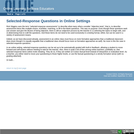
Selected-Response Questions in an Online Setting
- Subject:
- Education
- Material Type:
- Activity/Lab
- Reading
- Provider:
- AEA
- Provider Set:
- OLLIE
- Author:
- Evan Abbey
- Date Added:
- 12/01/2016

Selected-Response Questions in an Online Setting
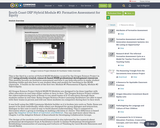
Oregon Science Project Module #3 Facilitator Video OverviewThis is the third in a series of Hybrid NGSS Modules curated by the Oregon Science Project in 2017 using already created, research-based NGSS professional development resources. This module focuses on formative assessment and how it can help educators to make student thinking visible and also how to use student ideas and models for teaching in the NGSS classroom. It builds on the work of the first two: Module #1 Phenomena & Equity, Module #2 Talk & Equity.All Oregon Science Project Hybrid NGSS PD Modules are designed to be done together with other educators in real time either online or face-to-face. The Oregon Science Project utilizes the videoconferencing tools of Zoom to run small teams of K-12 educators through these modules online in real time. Some Oregon Science Project Learning Facilitators are able to meet with their teams in person and still use these modules on computers during face-to-face work.It was built using the OER Commons Module builder so it is broken into units as Tasks. Some are meant to be done individually, while others are designed for group dialogue and interaction. Dialogue in this case is used as way to build shared understanding. This is compared to discussion where a group is working on making a decision or choice. This difference is based upon the Adaptive School Work of Garmston and Wellman. You can read more about this in Chapter 4 of the Adaptive School: A Sourcebook for Developing Collaborative Groups. The design of the modules and overall framework is also informed by the research about professional development from A Facilitator's Guide to Online Professional Development: Establishing Communities of Learning and Cultures of Thinking by Carol Brooks Simoneau and Gerald Bailey.Instructor DescriptionsAccompanying each task is a backend "Instructor Description." Each Instructor Description is only intended for the instructor or facilitator of the module and not the educator participating as a learner in the module. Each Instructor Description includesbakckground informationinstructions for facilitator preparationtips/ideas for facilitators working with a group onlinetips/ideas for face-to-face facilitationlinks to other resources when appropriateRemixing and Using this Module for Professional DevelopmentIf you would like to use this module, simply select REMIX and then edit your own copy so that it represents your facilitation style, local context, and professional development needs. This module was developed based upon the assumption that all participants have completed Oregon Science Project Hybrid NGSS Modules #1 and 2 and are studying the NGSS.Module #3 Components:Task #1 - Module #3 OverviewTask #2 - What is formative assessment? Individual WorkTask #3 - What is formative assessment? Group Reflection and DialogueTask #4- What are some high leverage practices for formative assessment in the NGSS classroom? Individual WorkTask #5 - What are some high leverage practices for formative assessment in the NGSS classroom? Group Reflection and DialogueTask #6 - How can we develop and use culturally responsive formative assessments for NGSS? Individual WorkTask #7 - How can we develop and use culturally responsive formative assessments for NGSS? Group Reflection and DialogueTask #8 - How can we integrate the NGSS practices into assessment tasks? Individual WorkTask #9 - How can we integrate the NGSS practices into assessment tasks? Group Reflection and Dialogue
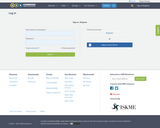
A general statistics course, which includes understanding data, measures of central tendency, measures of variation, binomial distributions, normal distributions, correlation and regression, probability and sampling distributions, Central Limit Theorem, confidence intervals, estimates of population parameters and hypothesis testing. Interpretation and data analysis are emphasized. PREREQUISITES: A grade of C or better in MAT 100 (Intermediate Algebra) or MAT 120 (Math Modeling for Liberal Arts) and placement above or successful completion of ENG 060 (Preparations for College Reading III). A student needs a thorough knowledge of Algebra, good reading skills and familiarity with the graphing calculator before entering this course.
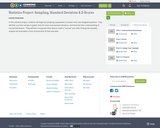
In this statistics project, students will begin by sampling a population to answer their own designed question. They will then use their sample to graph, find the mean and standard deviation, and illustrate their understanding of normal distribution. They will then manipulate their data to make it "normal" and, after finding new samples, analyze the associated z-score and percents of that new data.
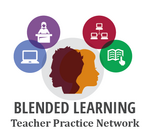
Students will explore the overarching question, is the internet trustworthy?, while expanding their knowledge of statistics and comparing data sets. They will compare two data sets as well as determine the accuracy or bias of data representations shown on the internet. Students will then have the opportunity to apply their knowledge while creating their own visual representations for data they personally collected regarding the trustworthiness of the internet. The module concludes with a peer showcase and the post-assessment.
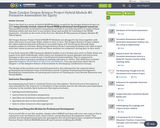
This is the third in a series of Hybrid NGSS Modules curated by the Oregon Science Project in 2017 using already created, research-based NGSS professional development resources. This module focuses on formative assessment and how it can help educators to make student thinking visible and also how to use student ideas and models for teaching in the NGSS classroom. It builds on the work of the first two: Module #1 Phenomena & Equity, Module #2 Talk & Equity.All Oregon Science Project Hybrid NGSS PD Modules are designed to be done together with other educators in real time either online or face-to-face. The Oregon Science Project utilizes the videoconferencing tools of Zoom to run small teams of K-12 educators through these modules online in real time. Some Oregon Science Project Learning Facilitators are able to meet with their teams in person and still use these modules on computers during face-to-face work.It was built using the OER Commons Module builder so it is broken into units as Tasks. Some are meant to be done individually, while others are designed for group dialogue and interaction. Dialogue in this case is used as way to build shared understanding. This is compared to discussion where a group is working on making a decision or choice. This difference is based upon the Adaptive School Work of Garmston and Wellman. You can read more about this in Chapter 4 of the Adaptive School: A Sourcebook for Developing Collaborative Groups. The design of the modules and overall framework is also informed by the research about professional development from A Facilitator's Guide to Online Professional Development: Establishing Communities of Learning and Cultures of Thinking by Carol Brooks Simoneau and Gerald Bailey.Instructor DescriptionsAccompanying each task is a backend "Instructor Description." Each Instructor Description is only intended for the instructor or facilitator of the module and not the educator participating as a learner in the module. Each Instructor Description includesbakckground informationinstructions for facilitator preparationtips/ideas for facilitators working with a group onlinetips/ideas for face-to-face facilitationlinks to other resources when appropriateRemixing and Using this Module for Professional DevelopmentIf you would like to use this module, simply select REMIX and then edit your own copy so that it represents your facilitation style, local context, and professional development needs. This module was developed based upon the assumption that all participants have completed Oregon Science Project Hybrid NGSS Modules #1 and 2 and are studying the NGSS.
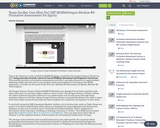
Oregon Science Project Module #3 Facilitator Video OverviewThis is the third in a series of Hybrid NGSS Modules curated by the Oregon Science Project in 2017 using already created, research-based NGSS professional development resources. This module focuses on formative assessment and how it can help educators to make student thinking visible and also how to use student ideas and models for teaching in the NGSS classroom. It builds on the work of the first two: Module #1 Phenomena & Equity, Module #2 Talk & Equity.All Oregon Science Project Hybrid NGSS PD Modules are designed to be done together with other educators in real time either online or face-to-face. The Oregon Science Project utilizes the videoconferencing tools of Zoom to run small teams of K-12 educators through these modules online in real time. Some Oregon Science Project Learning Facilitators are able to meet with their teams in person and still use these modules on computers during face-to-face work.It was built using the OER Commons Module builder so it is broken into units as Tasks. Some are meant to be done individually, while others are designed for group dialogue and interaction. Dialogue in this case is used as way to build shared understanding. This is compared to discussion where a group is working on making a decision or choice. This difference is based upon the Adaptive School Work of Garmston and Wellman. You can read more about this in Chapter 4 of the Adaptive School: A Sourcebook for Developing Collaborative Groups. The design of the modules and overall framework is also informed by the research about professional development from A Facilitator's Guide to Online Professional Development: Establishing Communities of Learning and Cultures of Thinking by Carol Brooks Simoneau and Gerald Bailey.Instructor DescriptionsAccompanying each task is a backend "Instructor Description." Each Instructor Description is only intended for the instructor or facilitator of the module and not the educator participating as a learner in the module. Each Instructor Description includesbakckground informationinstructions for facilitator preparationtips/ideas for facilitators working with a group onlinetips/ideas for face-to-face facilitationlinks to other resources when appropriateRemixing and Using this Module for Professional DevelopmentIf you would like to use this module, simply select REMIX and then edit your own copy so that it represents your facilitation style, local context, and professional development needs. This module was developed based upon the assumption that all participants have completed Oregon Science Project Hybrid NGSS Modules #1 and 2 and are studying the NGSS.Module #3 Components:Task #1 - Module #3 OverviewTask #2 - What is formative assessment? Individual WorkTask #3 - What is formative assessment? Group Reflection and DialogueTask #4- What are some high leverage practices for formative assessment in the NGSS classroom? Individual WorkTask #5 - What are some high leverage practices for formative assessment in the NGSS classroom? Group Reflection and DialogueTask #6 - How can we develop and use culturally responsive formative assessments for NGSS? Individual WorkTask #7 - How can we develop and use culturally responsive formative assessments for NGSS? Group Reflection and DialogueTask #8 - How can we integrate the NGSS practices into assessment tasks? Individual WorkTask #9 - How can we integrate the NGSS practices into assessment tasks? Group Reflection and Dialogue
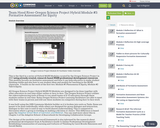
Oregon Science Project Module #3 Facilitator Video OverviewThis is the third in a series of Hybrid NGSS Modules curated by the Oregon Science Project in 2017 using already created, research-based NGSS professional development resources. This module focuses on formative assessment and how it can help educators to make student thinking visible and also how to use student ideas and models for teaching in the NGSS classroom. It builds on the work of the first two: Module #1 Phenomena & Equity, Module #2 Talk & Equity.All Oregon Science Project Hybrid NGSS PD Modules are designed to be done together with other educators in real time either online or face-to-face. The Oregon Science Project utilizes the videoconferencing tools of Zoom to run small teams of K-12 educators through these modules online in real time. Some Oregon Science Project Learning Facilitators are able to meet with their teams in person and still use these modules on computers during face-to-face work.It was built using the OER Commons Module builder so it is broken into units as Tasks. Some are meant to be done individually, while others are designed for group dialogue and interaction. Dialogue in this case is used as way to build shared understanding. This is compared to discussion where a group is working on making a decision or choice. This difference is based upon the Adaptive School Work of Garmston and Wellman. You can read more about this in Chapter 4 of the Adaptive School: A Sourcebook for Developing Collaborative Groups. The design of the modules and overall framework is also informed by the research about professional development from A Facilitator's Guide to Online Professional Development: Establishing Communities of Learning and Cultures of Thinking by Carol Brooks Simoneau and Gerald Bailey.Instructor DescriptionsAccompanying each task is a backend "Instructor Description." Each Instructor Description is only intended for the instructor or facilitator of the module and not the educator participating as a learner in the module. Each Instructor Description includesbakckground informationinstructions for facilitator preparationtips/ideas for facilitators working with a group onlinetips/ideas for face-to-face facilitationlinks to other resources when appropriateRemixing and Using this Module for Professional DevelopmentIf you would like to use this module, simply select REMIX and then edit your own copy so that it represents your facilitation style, local context, and professional development needs. This module was developed based upon the assumption that all participants have completed Oregon Science Project Hybrid NGSS Modules #1 and 2 and are studying the NGSS.Module #3 Components:Task #1 - Module #3 OverviewTask #2 - What is formative assessment? Individual WorkTask #3 - What is formative assessment? Group Reflection and DialogueTask #4- What are some high leverage practices for formative assessment in the NGSS classroom? Individual WorkTask #5 - What are some high leverage practices for formative assessment in the NGSS classroom? Group Reflection and DialogueTask #6 - How can we develop and use culturally responsive formative assessments for NGSS? Individual WorkTask #7 - How can we develop and use culturally responsive formative assessments for NGSS? Group Reflection and DialogueTask #8 - How can we integrate the NGSS practices into assessment tasks? Individual WorkTask #9 - How can we integrate the NGSS practices into assessment tasks? Group Reflection and Dialogue
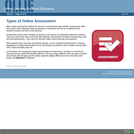
Types of Online Assessment